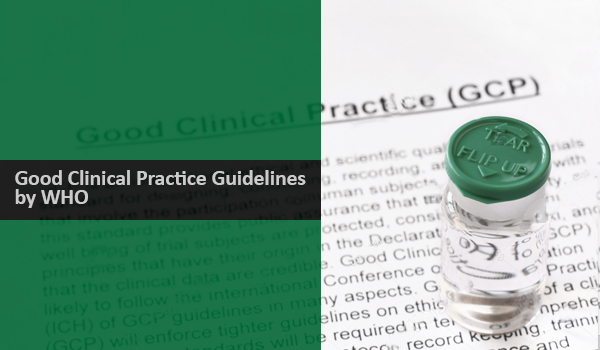Good Clinical Research Practice (GCP) is an established international ethical and scientific quality standard process for the design, conduct, performance, auditing, monitoring, recording, analysis, and reporting of clinical studies. GCP ensures that the reported data and results are credible and accurate, and the rights integrity and confidentiality of study subjects are respected and protected. All the stakeholders must adhere to the GCP standards including research subjects, sponsors, investigators, contract research organizations (CROs), site staff, ethics committees, and regulatory authorities.
Goals of Good Clinical Practice
The GCP is established with the following aims:
- To protect the rights,safety, and wellbeing of humans involved in research
- To assure the accuracy, reliability, quality and integrity of data collected
- To provide standards and guidelines for a well-conducted clinical research
- To speed up the marketing and promotion of new products
- To ensure benefit to both sponsors and consumers by reducing the cost of trial and investigation products.
Compliance of GCP assures public that the safety,rights and well-being of human subjects involved in research are protected and are consistent with the principles stated in the Declaration of Helsinki and other internationally recognized ethical guidelines.
Foundations for Ethical Conduct
Declaration of Helsinki
Declaration of Helsinki (1964) was developed as a statement of ethical principles to guide physicians and other participants in medical research involving human subjects.
The other foundations for the ethical conduct of clinical research include:
- The Nuremberg Code (1947): After the second world war, Nuremberg trials of war criminals resulted into introduction of 10 elements of medical ethics, known as ‘Nuremberg Code’, in August 1947, to protect human subjects from cruelty and exploitation while conducting human experiments.
- The Belmont Report (1979): As a result of National Research Act of 1974, the National Commission for the Protection of Human Subjects of Biomedical and Behavioral Research had written ‘The Belmont Report’. It was created to identify the basic ethical principles for the conduct of biomedical and behavioral research involving humans and develop guidelines to make sure that the research is conducted in accordance with the principles.
- International Conference on Harmonization (ICH-GCP): ICH provided the international quality standard to harmonize technical procedures and standards, enhance quality and accelerate time to market.
- International Standards Organization (ISO): ISO 14155:2011 developed international standards to protect the rights, wellbeing and safety of human subjects, ensure the accuracy and reliability of results, define the responsibilities of sponsorsand clinical investigators, and assist sponsors, investigators, regulatory authorities, ethics committees, and others involved in the conformity assessment of medical devices.
- Code of Federal Regulations (CFR): CFR is the codification rules and regulations published in the Federal Register by the federal government of the United States. The CFR includes FDA regulations on human subject protection and the conduct of clinical studies.
Background
WHO organized a ‘Scientific Group on Principles for Clinical Evaluation of Drugs’ in 1968 and then in 1975 to review and formulate principles and guidelines for clinical evaluation of drugs, new indications or dosage forms for marketed drug products and new combination products, and covering all aspects of drug development.In 1995,the WHO published ‘Guidelines for good clinical practice for trials on pharmaceutical products’ based on these reports.
WHO Principles of GCP
There are 14 principles of WHO GCP and are summarized as follows:
Principle 1 –Ethical Conduct: All clinical trials must adhere to basic ethical principles which have their origin in the Declaration of Helsinki, namely equal importance for persons, beneficence, and justice, permeate all other GCP principles.
Principle 2 –Protocol: A detailed, clear protocol including background, rationale, objective(s), design, methodology, statistical considerations, information, and organization of a trial should be laid out for every clinical research involving human subjects and comply with scientific standards.
Principle 3 – Risk Identification: Beforea study/trial is initiated, all foreseeable inconveniences and risks should be assessed against the estimated benefit(s)for the individual trial subject and society. A proposed clinical trial should be supported by sufficient non-clinical and clinical information for source of information, knowledge of literature, and on adequate lab, and where applicable, animal experimentation.
Principle 4: Benefit-Risk Assessment: Trial with human subjects should be initiated and continued only if the predicted benefits outweigh the risks for the individual and society. The safety and well being of the trial subjects should be considered most important over the interest of science and society.
Principle 5 – Review By IEC/IRB:A protocol review of a clinical trial involving humans,should be submitted for consideration, guidance, evaluation, comments, and approval by specially appointed independent ethics committee/institutional review board (IEC/IRB).
Principle 6 – Protocol Compliance: Research with humans should be well-conducted in compliance with the protocol after approval by IEC/IRB. Any deviation or changes of the protocol shouldn’t be applied by the investigator without the sponsor’s agreement and documented approval/favorable opinion by IEC/IRB.
PRINCIPLE 7 – Informed Consent: A freely provided informed consent from each human subject before participation in any clinical trial should be obtained in compliance with the national culture(s) and requirements. The subjects should volunteer as informed participants. If giving informed consent is not possible for any subject, a legally authorized representative should give permission,by applicable law.
Principle 8 – Continuing Review/Ongoing Benefit-Risk Assessment: Clinical trials having humans as research subjects should be continued only if the benefit-risk assessment remains favorable. The sponsors should ensure a process to assess and evaluate the drug development continuously during the clinical trial. The ethics committee should conduct reviews during the research and monitor its progress.
Principle 9 – Investigator Qualifications: On behalf of the trial subjects, the decisions and medical care should be made by a qualified and duly licensed medical professional, i.e., physician or, when appropriate, a dentist.
Principle 10 – Staff Qualifications: Every individual who is involved in directing a trial must be qualified by training, education, and experience to perform their respective task. This includes the investigator and his/her supporting staff to assist him.
Principle 11 – Records: All the information during the clinical trial should be recorded, handled, and stored in a way to allows accuracy in its interpretation, reporting, maintenance, and verification.
Principle 12 –Confidentiality/Privacy: The confidentiality of records that could identify subjects must be protected, respecting the privacy and confidentiality rules in compliance with the applicable regulations This is done to safeguard the integrity of subjects.
Principle 13 – Good Manufacturing Practice (GMP): Manufacturing, handling, and storage of investigational product(s) should be in accordance with applicable GMP and should be used in accordance with the approved protocol.
Principle 14 – Quality Systems: Systems with procedures that assure the control assure and improve the quality of every aspect of the clinical trial must be implemented.
Turacoz Healthcare Solutions understands and abides by the GCP. We aim to deliver the best of the information about clinical research. Turacoz is a medical communications company, which offers services to healthcare professionals in clinical research, regulatory writing, publication writing, medico-marketing writing, and support for conducting medical advisory board meetings.
If you have any queries, email us at hello@turacoz.in.
References
- World Health Organization. Handbook for Good Clinical Research Practice (GCP), 2002. Available at https://www.fda.gov/files/medical%20devices/published/Presentation–Good-Clinical-Practice-101–An-Introduction-%28PDF-Version%29.pdf. As accessed Apr 14, 2020.
- Vijayananthan A, Nawawi O. The importance of Good Clinical Practice guidelines and its role in clinical trials. Biomed Imaging Interv J. 2008;4(1):e5.
- S. Food and Drug Administration. Good Clinical Practice 101: An Introduction. Available at https://www.fda.gov/files/medical%20devices/published/Presentation–Good-Clinical-Practice-101–An-Introduction-%28PDF-Version%29.pdf. As accessed Apr 14, 2020.
- Permissible Medical Experiments. Trials of War Criminals before the Nuremberg Military Tribunals under Control Council Law No. 10: Nuremberg October 1946–April 1949. Washington: U.S. Government Printing Office (n.d.), 2,181-182.
- The National Commission for the Protection of Human Subjects of Biomedical and Behavioral Research. The Belmont Report: Ethical Principles and Guidelines for the Protection of Human Subjects of Research (1979).
- International Organization for Standardization. ISO 14155:2011: Clinical investigation of medical devices for human subjects — Good clinical practice (2011). Available at https://www.iso.org/standard/45557.html.As accessed Apr 14, 2020.
- S. Food and Drug Administration: FDA Regulations Relating to Good Clinical Practice and Clinical Trials (2015). Available at https://www.fda.gov/about-fda/center-drug-evaluation-and-research-cder/fda-regulations-relating-good-clinical-practice-and-clinical-trials.As accessed Apr 14, 2020.































